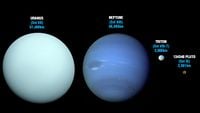Pluto: Difference between revisions
From Halopedia, the Halo wiki
mNo edit summary |
No edit summary |
||
| Line 20: | Line 20: | ||
|current threat to array= | |current threat to array= | ||
}} | }} | ||
[[File:Outerplanets.jpg|thumb|left|Pluto along with Uranus, Neptune and Neptune's moon Trition.]] | |||
'''Pluto''', formal designation '''134340 Pluto''', is a dwarf planet in the [[Sol system]], and the second-largest known dwarf planet (after Eris) as well as the tenth-largest body observed directly orbiting [[Sol]]. It was named after the Roman God of the Underworld. The [[Remote Scanning Outpost]] ''[[Democritus]]'' is on this Dwarf Planet. On November 3, [[2552]], the Monitoring Station detected [[Cortana]]'s signal in [[Slipspace]] with [[Dr. Halsey]]'s message to [[Lord Hood]].<ref>'''[[Halo: Ghosts of Onyx]]''', ''page 212''</ref> | '''Pluto''', formal designation '''134340 Pluto''', is a dwarf planet in the [[Sol system]], and the second-largest known dwarf planet (after Eris) as well as the tenth-largest body observed directly orbiting [[Sol]]. It was named after the Roman God of the Underworld. The [[Remote Scanning Outpost]] ''[[Democritus]]'' is on this Dwarf Planet. On November 3, [[2552]], the Monitoring Station detected [[Cortana]]'s signal in [[Slipspace]] with [[Dr. Halsey]]'s message to [[Lord Hood]].<ref>'''[[Halo: Ghosts of Onyx]]''', ''page 212''</ref> | ||
Revision as of 08:39, July 29, 2011
Template:SeeWikipedia Template:Planet
Pluto, formal designation 134340 Pluto, is a dwarf planet in the Sol system, and the second-largest known dwarf planet (after Eris) as well as the tenth-largest body observed directly orbiting Sol. It was named after the Roman God of the Underworld. The Remote Scanning Outpost Democritus is on this Dwarf Planet. On November 3, 2552, the Monitoring Station detected Cortana's signal in Slipspace with Dr. Halsey's message to Lord Hood.[1]
As of 2552 there are no human facilities on the dwarf-planet's surface, however several military and scientific stations orbit Pluto.[2] The only known such facility is Kelvin Research Station.[3]
History
Pluto was discovered during 1930, and was then thought to be the ninth and final planet of the Solar System. Its first moon, Charon, was discovered during 1978. During 2005, two smaller moons were discovered. During 2006, arguments began to arise on whether Pluto was actually large enough to be considered a planet. After much debate, Pluto (along with the asteroid Ceres and the object Eris) became newly classified as dwarf planets.
In 2006, a space probe named New Horizons was launched to gather more information on Pluto. It was scheduled to arrive at the dwarf planet in 2014 or 2015. It was the first spacecraft to ever visit Pluto.
Appearances
- Halo: Ghosts of Onyx (First appearance)
- Halo Evolutions
Sources
- ^ Halo: Ghosts of Onyx, page 212
- ^ Halo Encyclopedia, page 283
- ^ Halo: Evolutions - Essential Tales of the Halo Universe, "The Impossible Life and the Possible Death of Preston J. Cole", page 458
